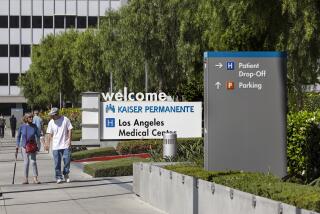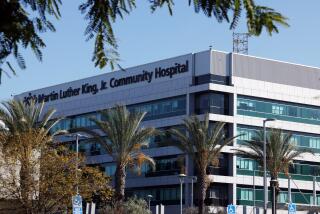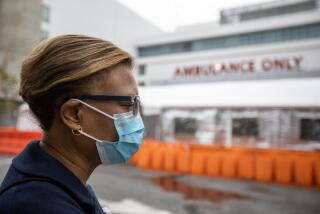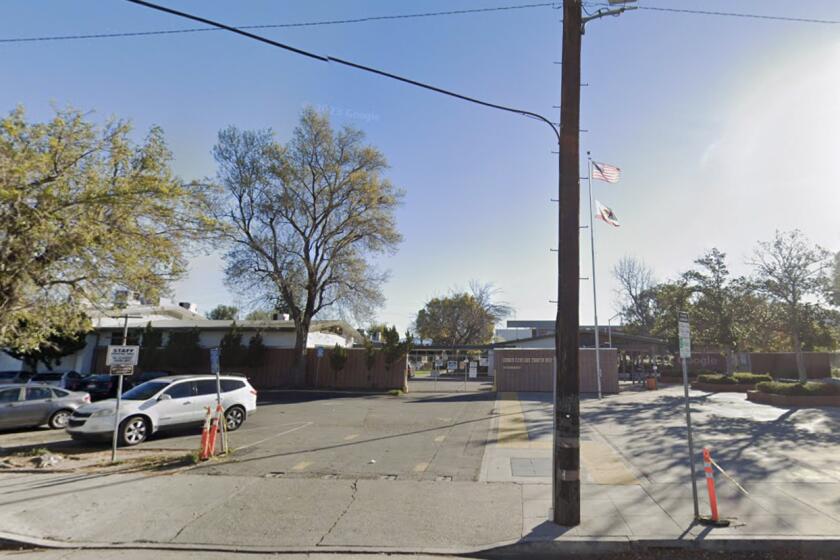Kaiser Official Apologizes
OAKLAND -- Kaiser Permanente’s top official in Northern California publicly apologized Wednesday to patients who felt that their complaints about the giant HMO’s new kidney transplant center had been ignored -- but emphasized that the problems came as a surprise to her.
“I am not personally aware of complaints that have come in regarding the kidney transplant program,” said Mary Ann Thode, president of Kaiser’s Northern California region, at a news conference held to ease public concerns and announce reforms for the troubled program. “I have actually received numerous letters from patients who have actually been happy with the care.”
Thode’s organization, however, was repeatedly informed of patients’ dissatisfaction, according to interviews and documents obtained by The Times.
Kaiser doctors and staff ignored or discounted patients’ concerns about potentially dangerous delays in their care, and at times curtly denied their requests to be transferred elsewhere.
Some patients put their complaints in writing, chiding Kaiser in heartfelt, often angry, letters. Copies of such correspondence were furnished by patients and reviewed by The Times.
“My health is deteriorating, and I feel that my life has no value to Kaiser’s transplant department,” wrote Jewell Hague in an April 2005 missive describing misplaced medical records, fumbled paperwork and months of inexplicable delays.
The letter, which was sent to a transplant official and copied to Dr. Robert Pearl, chief executive officer of the Permanente Medical Group in Northern California, concluded: “Shame on you!”
At the news conference at Kaiser’s Northern California headquarters Wednesday, Thode and the state’s top HMO regulator made a joint appearance. As part of an agreement with the state Department of Managed Health Care, Kaiser said it would pay for kidney transplants at outside hospitals for patients dissatisfied with Kaiser’s program, which opened in 2004 and now has more than 2,000 patients waiting for kidneys.
“We moved very quickly on this situation, because patient safety is paramount to the department and to Kaiser as well,” said Cindy Ehnes, director of the managed care department.
The reforms follow reports in The Times last week that described how Kaiser placed up to 1,500 patients in jeopardy by forcing them from established transplant programs at UC San Francisco or UC Davis, where Kaiser had contracts, into a fledging program operated directly by the health maintenance organization.
At Kaiser’s new center in San Francisco, the number of transplants dropped sharply, leaving many patients on prolonged dialysis, which can lead to deadly complications and dampen prospects for successful transplants later.
Hundreds of patients were in limbo for months -- with little hope of receiving new kidneys -- because Kaiser failed to properly handle paperwork transferring them from their old programs to the new one.
Asked whether anyone suffered because of the program’s rocky start-up, Thode said Wednesday: “I certainly hope that no one was harmed or died. I want to finish the initial review before I make any comment.”
Kaiser said its transplant patients may opt to have their surgeries at UC Davis or UC San Francisco. The offer applies to the 1,200 patients who had been treated previously at the UC programs, as well as the 850 people who have more recently joined Kaiser’s waiting list.
A patient wishing to go elsewhere must first consult his or her treating kidney specialist, in addition to a patient advocate or ombudsman, said Thode, whose title is regional president of Kaiser Foundation Health Plan and Hospitals.
“We want to be sure that they understand completely their medical condition and that they understand the practicality” of moving to another program, she said.
In the end, she said, the final decision is the patients’.
One who wants out is Bernard Burks, 56. The real estate appraiser said Wednesday that Thode’s apology was too little, too late for him and for those Kaiser patients who didn’t live long enough to hear it. “The guys who died [awaiting their transplants], they don’t hear the apology at all.”
(Although The Times’ investigation did not directly link Kaiser’s care to individual patient deaths, the newspaper found that twice as many people died waiting for kidneys at Kaiser as received them in 2005 -- a pattern that is the reverse of statewide trends.)
Burks said he had made no secret of his dissatisfaction with Kaiser. In October, for instance, he wrote to a Kaiser transplant coordinator: “This transplant department was new last November [2004]; how long can you use that as an excuse for your failures. There is no reason for all the mistakes, loss paperwork, failure to communicate with your staff, other doctors and most of all the patients. The lack of standing up to the blame when it’s obvious you have dropped the ball.”
Based on his own experience, Burks voiced skepticism Wednesday at Thode’s contention that she knew nothing of the problems in the program. “It just doesn’t add up,” he said.
This week, Burks drove 100 miles from his home in Rancho Murrieta to meet with Kaiser officials in San Francisco to discuss his complaints. He said a top doctor there told him that news reports about Kaiser’s program were incomplete and asked for one more chance to arrange a transplant this month, using a kidney that Burks’ daughter is willing to donate.
But Burks said he wasn’t convinced. “I think they just don’t know what they’re doing,” he said.
For Antioch resident Sheila Wiley, Wednesday’s announcement was no consolation.
“Are you serious? You’re joking,” she said to a reporter. “I can’t believe it. It’s just that, for me, I’m almost two years behind. I probably already would have been transplanted if I had been treated at UCSF or UC Davis.”
The human resources consultant said she battled with Kaiser transplant officials for months over various problems, including its perplexing rejection of her nephew as a living donor. Wiley said her request to transfer to UC San Francisco was denied.
She said she was ultimately permitted to join the waiting list at the university -- after changing insurers.
Ehnes, director of the managed care department, said Kaiser’s lack of follow-up on complaints is a serious matter.
“The allegations raised really call into mind some larger concerns about how complaints are heard within the Kaiser system and addressed,” she said.
She also acknowledged that her own agency had not picked up on the problems, even though it operates a toll-free complaint line. “At some level, there is a failure that the public does not understand their rights under state law to involve us, and I really am concerned about that,” she said.
Ehnes said she plans to arrange a meeting among Kaiser, UC Davis and UC San Francisco transplant officials to ensure that patient requests for a transfer are handled properly.
“Patients will not slip through the cracks, period,” she said. “I’m really concerned about patients that have been moved and now, perhaps, will be moved again.”
*
Charles Ornstein, who reported from Oakland, may be contacted at charles.ornstein @latimes.com and Tracy Weber, who reported from Los Angeles, at tracy.weber@latimes.com.
More to Read
Start your day right
Sign up for Essential California for news, features and recommendations from the L.A. Times and beyond in your inbox six days a week.
You may occasionally receive promotional content from the Los Angeles Times.






